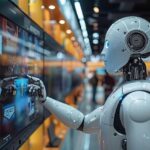The manufacturing sector has witnessed a significant transformation in recent decades, with technological advancements playing a pivotal role. One of the most revolutionary influences has been the advent of machine learning. As a subset of artificial intelligence, machine learning allows systems to learn from data, identify patterns, and make decisions with minimal human intervention. Here are groundbreaking ways in which machine learning has redefined the manufacturing landscape.

1. Predictive Maintenance and Reduced Downtime
Predictive maintenance has emerged as one of the transformative applications of machine learning in manufacturing. By analyzing vast amounts of data, machine learning algorithms can predict when a piece of equipment will likely fail or require servicing. This foresight allows companies to perform maintenance tasks quickly, preventing unexpected breakdowns and costly downtimes. As a result, the manufacturing process becomes more streamlined, efficient, and cost-effective. The integration of machine learning, especially in predictive maintenance, is revolutionizing how industries operate by significantly enhancing reliability and production continuity.
2. Enhanced Quality Control and Detection
In the intricate manufacturing world, quality control stands as a non-negotiable cornerstone, determining the success and reliability of end products. With the advent of machine learning, there’s a transformative shift towards automating quality inspection processes, promising unprecedented accuracy and efficiency. These sophisticated systems are trained on vast datasets comprising images of perfect products juxtaposed with those showcasing defects and irregularities. Once trained, the machine learning model can scan products in real-time during production, instantly pinpointing and flagging deviations or anomalies. Such proactive and rapid detection curtails wastage at the source and fortifies product standards, effectively minimizing the repercussions of costly recalls and safeguarding against potential customer dissatisfaction.
3. Optimized Supply Chain Management
The intricate web of the supply chain, which spans suppliers, meticulous production processes, strategic inventory management, and end-to-end logistics, is a realm ripe for the transformative touch of machine learning. Sophisticated algorithms, equipped with the power to sift through and analyze enormous datasets, can draw correlations from seemingly disparate data points – be it global economic trends or specific local weather fluctuations. With their inherent predictive prowess, these algorithms can forecast potential spikes or dips in demand and even sound early alarms on looming supply chain disruptions. With such forward-looking insights, manufacturers and supply chain managers can make nimble adjustments, whether ramping production or tweaking inventory buffers. Consequently, this proactive approach ensures timely product deliveries, fine-tuning inventory holdings, and a tangible reduction in associated costs, bringing both efficiency and resilience to the supply chain.
4. Personalized Production and Customization
As the industrial age’s hallmark of mass production gradually makes room, a new paradigm, mass customization, is taking center stage in the manufacturing landscape. Today’s discerning consumers no longer seek just off-the-shelf solutions; they crave products that resonate with their unique preferences and tastes. Machine learning is a linchpin in this transformation, deftly analyzing vast consumer data to glean insights, spot emerging trends, and even preempt specific consumer requirements. With these data-driven insights, manufacturers can nimbly recalibrate their production lines, ensuring they cater to these bespoke demands. This capability to pivot and adapt while still maintaining the essence of mass production ensures that customization doesn’t come at the expense of efficiency or induce prohibitive costs.
5. Energy Efficiency and Sustainability
In today’s rapidly evolving industrial landscape, the imperatives of sustainability and energy conservation have risen to the forefront, reshaping the ethos of modern manufacturing. With its expansive analytical prowess, machine learning offers a beacon of hope in navigating these challenges more adeptly. By diving deep into data streams related to energy consumption and operational metrics, these algorithms can unearth inefficiencies, subsequently suggesting actionable optimizations. This could manifest in strategies like recalibrating machine operations to leverage off-peak energy tariffs or refining processes to curtail waste dramatically. By adopting such data-driven measures, manufacturers witness tangible reductions in operational expenses and underscore their commitment to aligning business objectives with broader global sustainability ambitions.
Conclusion
The transformative power of machine learning in the realm of manufacturing is undeniable. By intertwining data-driven insights with core manufacturing processes, industries realize heightened efficiencies, reduced costs, and enhanced product quality. Beyond tangible benefits, machine learning also supports the broader visions of sustainability, customization, and adaptability in an ever-evolving market landscape. As machine learning advances, its symbiotic relationship with manufacturing promises even more revolutionary breakthroughs, heralding a future where intelligent manufacturing is the norm, not the exception.
Author Profile

-
Hi I am Karan a passionate blogger and i live in Delhi. It's almost 5+ years when I started blog writing in 2019. I am the owner of the Dailylist.in. My dedication to delivering reliable information and useful tips has earned him a loyal following among tech enthusiasts seeking reliable insights and recommendations.
If You have any query then email Us. dailylist88@gmail.com
Latest entries
 Delhi20 October 2024Top 7 Best Professional Makeup Artist Course in Delhi NCR
Delhi20 October 2024Top 7 Best Professional Makeup Artist Course in Delhi NCR How to12 September 2024How Are Modern Generative AI Systems Improving User Interaction?
How to12 September 2024How Are Modern Generative AI Systems Improving User Interaction? Business10 September 2024The Future of Real Estate: Is Now the Right Time to Buy or Sell?
Business10 September 2024The Future of Real Estate: Is Now the Right Time to Buy or Sell? Blog8 September 2024Which are the Best Astrology Websites for a Free Online Birth Chart?
Blog8 September 2024Which are the Best Astrology Websites for a Free Online Birth Chart?






